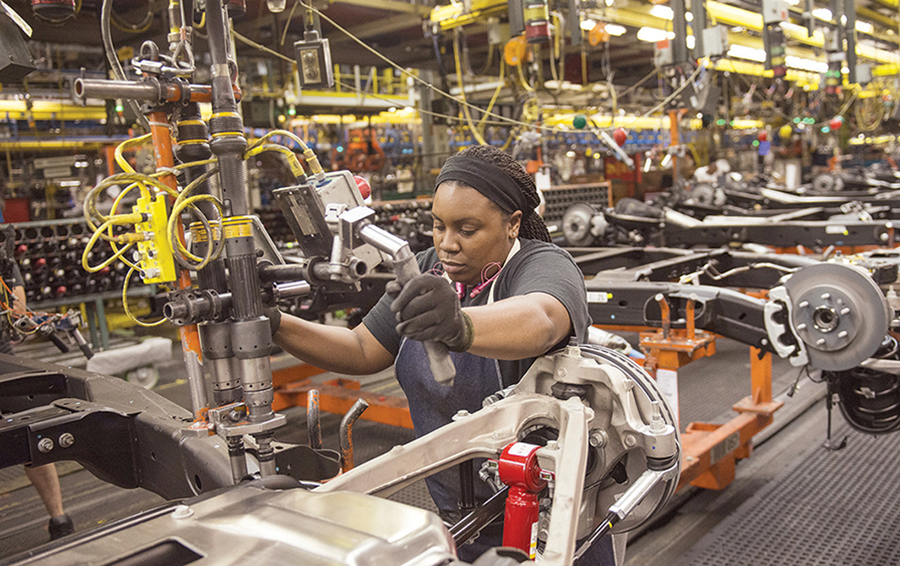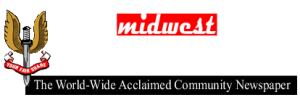Nigeria Ranks 131 in World Bank’s Ease of Doing Business Index

A typical underperforming factory in Nigeria
By Oluwatosin E. Oladetan (MBA, ACCA, PMP, NlIM, FMVA, BIDA, SPY-SP, TRCN)
Nigeria is a Developing Sovereign State with one of the largest economies in Africa.
Nigeria has been on this development path since she gained independence and has refused to achieve the status of a developed economy.
This, we could say, is due to several factors, not restricted to poor industrialization.
Although we have some developed sovereign states, such as Singapore and Switzerland, among others, that did not take the industrial pathway to achieving the status of a developed nation not because it is bad but due to their peculiarities.
Nigeria is so blessed with an abundance of natural resources, a growing population of over 200 million, primarily dominated by young people who are expected to be very vibrant and ready to contribute to economic growth, access to support and partnership from international communities and multilateral organizations.
The growth in the Nigerian manufacturing sector has been very volatile and oscillating over the last decade, as there has not been significant growth in the value of investment in the sector despite the need for investment in the manufacturing operating environment.
A review of Q4-2023 GDP reveals that manufacturing accounts for 16.04% of the quarter’s GDP and 15.67% of the full-year GDP at current basic prices.
The report also revealed that the manufacturing sector had a nominal growth rate of 38.06% for the quarter and 30.93% for the full year.
The nominal GDP in the sector is primarily driven by the food, beverage, and tobacco sub-sector, which recorded a quarter GDP growth of 66.02% and a yearly GDP growth of 48.75%.
Considering the base effect in the estimation of real GDP growth, the sector improved slightly by 1.38% for Q4-2023 and 1.40% for the full year 2023.
The manufacturing sector contribution to GDP impact is felt in the industries category, which has the lowest contribution to GDP (17.34% in the quarter and 18.65% in the full year) when compared to the total contribution of agriculture, industries, and services.
When reviewing GDP growth, industries contribute 3.86%, while others contribute (agriculture: 2.10% and services: 3.98%).
A review of the Q4-2023 foreign trade statistics revealed that manufactured goods account for 34.56% of the total trade as of Q4-2023.
The manufacturing share of total trade is primarily driven by imports, of which manufactured goods account for 63.98% of total imports, while total manufactured goods exported account for just 1.85% of total goods exported for the period Q4-2023.
On a full-year comparative basis, the manufacturing goods share of total exports has been on a downward trend within 2019 (10.81%) and 2023 (2.16%); the manufacturing share of total imports has also been on a downward trend within 2019 (70.38%) and full-year 2022 (43.09%) before increasing in 2023 (51.23%).
A deep dive into the major manufactured products being traded within Q4-2023 revealed that unwrought aluminum alloy contributed most significantly to the total goods being exported, while the major chunk of the manufactured goods being imported are tanks and other armored fighting vehicles, motorized vehicles, and whet.
Despite the great importance of the manufacturing sector’s contribution to the development of the Nigerian economy, the current state of the Nigerian manufacturing sector has not been very attractive to a willing investor.
This mayhem is driven by several factors, of which some are listed here: Nigeria is ranked 131st in the World Bank’s Ease of Doing Business Index.
Despite moving up 15 places from 146th position across 190 countries, with a current DB score of 56.9, in line with the ease of doing business measurement and transformation carried out across 41 component indicators on 10 major areas such as starting a business, dealing with construction permits, obtaining electricity, registering property, obtaining credit, protecting minority investors, tax payments, cross-border trading, contract enforcement, and resolving insolvency.
Access to Capital: The Nigerian manufacturing industry is seriously undercapitalized despite the significant improvement in capital importation targeted at the manufacturing sector over the last five years, from 3.99% of total capital imported in 2018 to 40.73% in 2023.
There is little or no platform available for small-scale manufacturing companies to have access to either debt or equity funding.
Over the last few days, highly geared (high level of debt investment) manufacturing companies from financial Nigerian deposit money banks would have had their hit of the increase in the monetary policy rate at the 293rd monetary policy committee meeting of 12 members (9 men and 3 women) by 400 basis points (4%) from 18.75% to 22.75%.
This will also impact on the cost of any firm’s equity capital, as the cost of equity is expected to be more expensive than debt due to the greater risk borne by shareholders.
The Central Bank of Nigeria (CBN), Africa Export Import Bank (AFREXIM), Africa Development Bank (AFDB), Nigeria Export Import Bank (NEXIM), through the Bank of Industry (BOI), and other financial institutions have availed of several interventions in increasing access to debt capital at very low interest rates, restructuring non-performing loans, and expanding manufacturing capacities.
However, these funds are not just sufficient; they are also available to a restricted group of companies, rather than the manufacturing companies that these funds will have a major impact on.
A classic example is that a bank is not willing to lend a facility to a startup that has a bright idea but does not have collateral or consistent cashflows.
In my interaction with several venture capitalists and angel investors operating while assisting startup manufacturing companies to raise capital, there is little or no hope for the small-scale manufacturers in Nigeria.
The Nigerian crowd and pool funding community have not also achieved the maturity level required to assist small-scale manufacturers grow into maturity and contribute effectively to sustainable economic development.
Resource Curse: Nigeria is a land blessed with so many natural resources that are currently being exploited and unexploited as new resources are discovered.
Where Nigeria really missed the shot was after the discovery of crude oil in Oloibiri in 1956, when investments and contributions to other sectors of the economy were avoided.
The oil regions have also not attained the status of mega or developed cities within Nigeria. Despite crude oil accounting for 82.50% of the Nigerian total exports in Q3-2023, Nigeria does not have a functional refinery that can sufficiently generate crude oil derivatives to satisfy the demand of the populace.
Refined petroleum products still account for over 30% of all the country’s imports over the years.
The Nigerian National Petroleum Corporation stated that it will still take a decade to have all the Nigerian petroleum products addressed internally, despite collaboration with Nigeria’s biggest conglomerate, Dangote, to establish the largest single-train refinery in the world with a processing capacity of 650,000 barrels per day of crude oil.
Supporting Technology and Infrastructure: The Nigerian manufacturing sector cannot attain the desired status and height without the right and enabling supporting infrastructures such as access to a very good logistic support system (good road, rail, marine, and air) for movement and distribution of goods across the value chain.
Power generation has also posed great concern to the sector, as energy consumption is on the high side due to low generation and poor supply of electricity from the national grid across the nation.
The removal of the fuel subsidy also increased the cost of obtaining diesel, as most manufacturing companies generate power through diesel or gas.
Increased vandalization of gas pipelines and a lack of sufficient resources and capacity to generate and distribute power have also posed a huge risk.
Read Also: Edo PDP Heads ‘South’, as Shaibu, Ojezua, Others Drags Ighodalo, PDP, INEC to Court over Primary
Internet penetration in the country has continued to grow year-over-year, which has helped increase the acceptance of technology and automation of processes across several institutions in the country.
Where there is a major issue is that the Nigerian environment is not suitable for the initiation, development, refining, and advancement of the technology that will deliver the right value to all stakeholders across the board (heavy reliance on imported technology).
Economic Climate Instability: This could have been addressed under access to capital but is specially called out due to the huge impact it has on the sector.
Over 1,000 manufacturing companies experienced casualties (winding up or distress) in 2023 due to unplanned movement and volatility in the exchange rate, inflation, reduced capital importation, and increased tax and regulatory burdens.
This index not only reduced capacity utilization and resourcefulness, but there was also a large junk of inventory with a great risk of being considered obsolete as consumers were not willing to afford these same goods due to the cost-push inflation effect passed down to customers through price increases.
The average Nigerian became poorer in 2023 and hence had a shrinking or curtailment of expenses or lower demand for normal and luxury goods and services.
The foreign exchange losses recorded by several manufacturing companies completely or nearly wiped out shareholders’ capital and accumulated retained earnings.
A few companies had no choice but to bow out by leaving the stock exchange for a few listed, ceased operations in Nigeria while continuing operations in other markets, or not cease operations.
Increasing manufacturing companies’ ability to strive in Nigeria without the right framework and pathway for addressing monetary and fiscal policy issues is indeed a tall order.
Read Also: APC Slips into Deeper Crisis…Olanikpeku Writes INEC, Says Idahosa was Certified Winner by Commission
To attain long-term economic growth and development in Nigeria, there is a need for the collaboration of a diverse set of individuals across several parastatals, regulatory agencies, investor niches, local, regional, and international communities to provide some contribution to the development of a betterNigeria Nigeria.











2 thoughts on “Nigeria Ranks 131 in World Bank’s Ease of Doing Business Index”